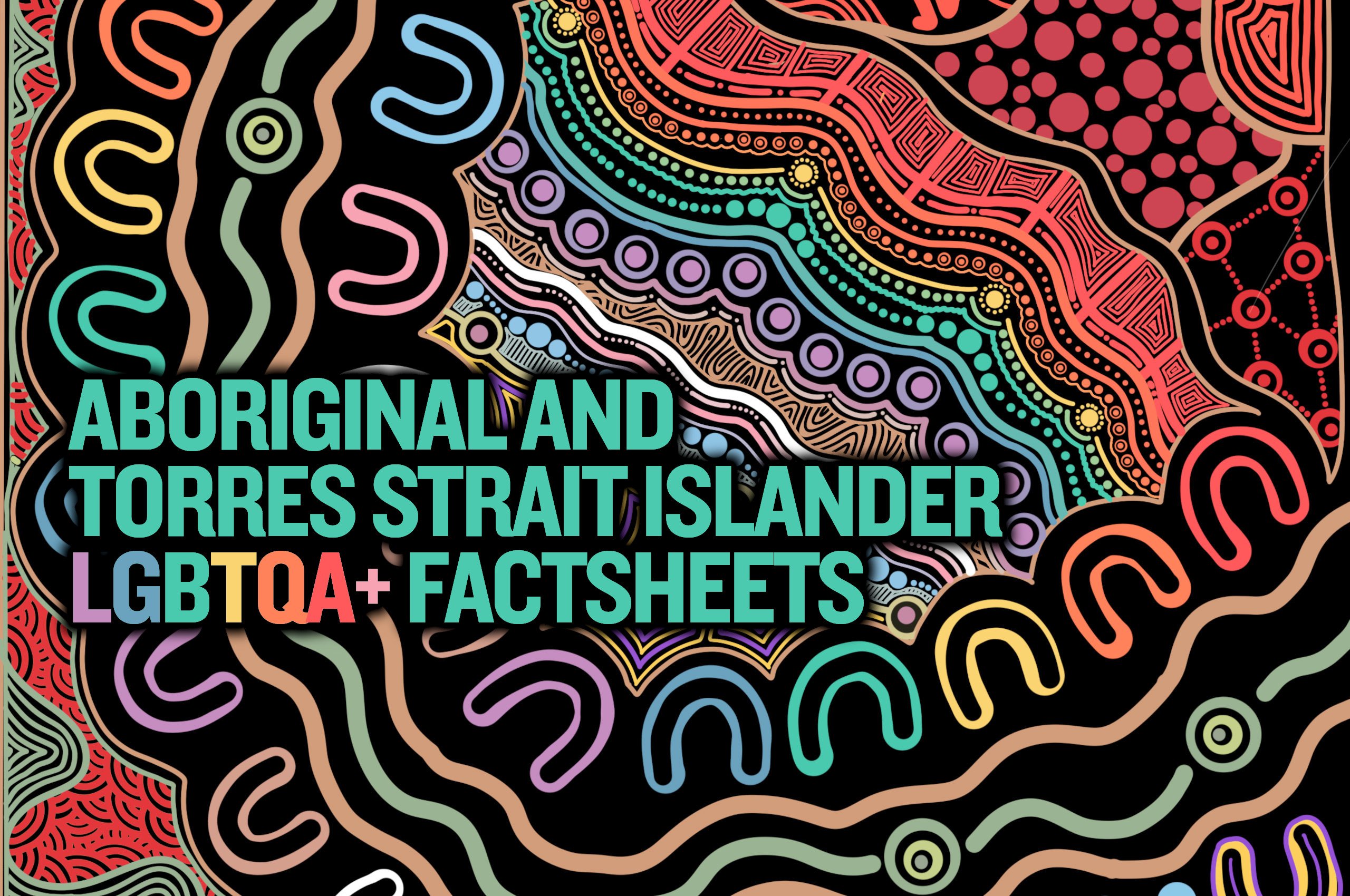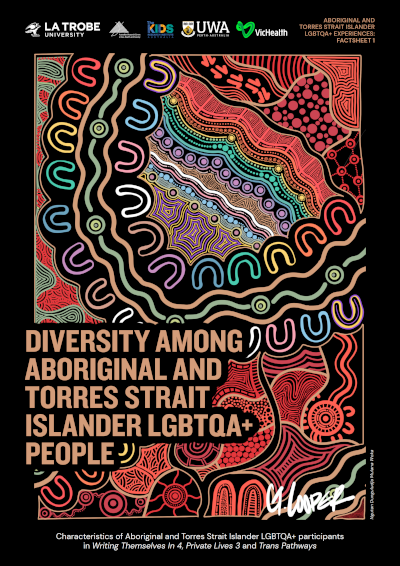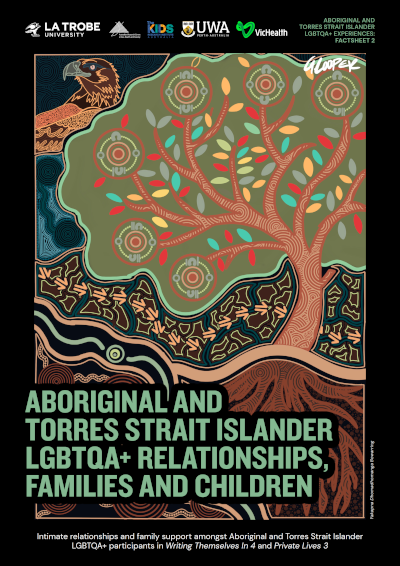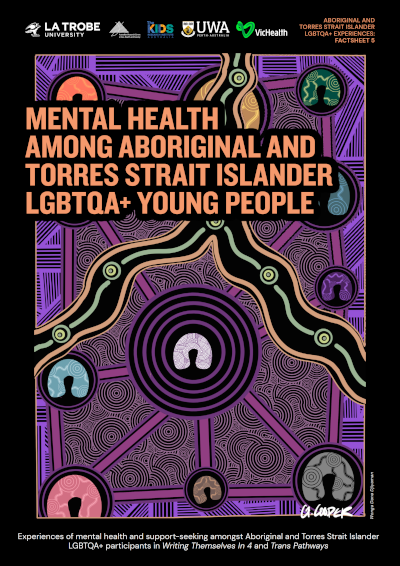Aboriginal and Torres Strait Islander LGBTQA+ people

The health, wellbeing and experiences of Aboriginal and Torres Strait Islander LGBTQ+ people
2024
Between 2017 and 2020, several national surveys of LGBTQA+ people across Australia were conducted by the Telethon Kids Institute (now the Kids Research Institute) and by ARCSHS. These included:
- Trans Pathways: a study of trans and gender diverse young people and their mental health and care pathways
- Private Lives 3: a study of health and wellbeing among LGBTQ+ adults (aged 18+)
- Writing Themselves In 4: a study of health and wellbeing among LGBTQA+ young people (aged 14-21)
Each of these studies heard from some LGBTQA+ people who were also Aboriginal and Torres Strait Islander (we outline exactly how many in the first factsheet listed below). To highlight their specific and unique experiences, this project sought to draw together the responses from these LGBTQA+ Aboriginal and Torres Strait Islander people and present them in a series of factsheets. We deliberately focussed certain factsheets on topics that are more affirming and positive, as well as ones that address more complex and concerning issues, such as mental health.
Health and wellbeing of Aboriginal and Torres Strait Islander LGBTQ+ people
Factsheet 1: Diversity among Aboriginal and Torres Strait Islander LGBTQA+ People 
Characteristics of Aboriginal and Torres Strait Islander LGBTQA+ participants in Writing Themselves In 4, Private Lives 3 and Trans Pathways.
Factsheet 2: Aboriginal and Torres Strait Islander LGBTQA+ relationships, families and children 
Intimate relationships and family support amongst Aboriginal and Torres Strait Islander LGBTQA+ participants in Writing Themselves In 4 and Private Lives 3.
Factsheet 3: Feeling good as an Aboriginal or Torres Strait Islander LGBTQA+ young person 
Findings from Aboriginal and Torres Strait Islander LGBTQA+ participants in Writing Themselves In 4 and Trans Pathways about practices and experiences that affirmed their sexuality and/or gender identity.
Factsheet 4: Experiences of affirmation among Aboriginal and Torres Strait Islander trans and gender diverse people 
The experiences of Aboriginal and Torres Strait Islander trans and gender diverse participants in Writing Themselves In 4, Private Lives 3 and Trans Pathways in how they desire, access or experience gender affirmation and how they are treated by others.
Factsheet 5: Mental health among Aboriginal and Torres Strait Islander LGBTQA+ young people 
Experiences of mental health amongst Aboriginal and Torres Strait Islander LGBTQA+ young people in Writing Themselves In 4 and Trans Pathways.
Factsheet 6: Mental health among Aboriginal and Torres Strait Islander LGBTQA+ adults 
Experiences of mental health amongst Aboriginal and Torres Strait Islander LGBTQA+ adult participants in Private Lives 3.
Factsheet 7: Experiences in education among Aboriginal and Torres Strait Islander LGBTQA+ young people 
Experiences of school, TAFE and university as an Aboriginal and/or Torres Strait Islander LGBTQA+ person among participants in Writing Themselves In 4.
Project videos
Watch this 2.5-minute video with two of the research team, Darcy Wallis and Shakara Liddelow-Hunt, as they talk about the findings from the study and what they mean.
Also joining them in the video is Peter Waples-Crowe, a member of the Project Governance group, who talks about the steps that need to be taken in response to ensure safe, inclusive and affirming environments for LGBTQA+ Aboriginal and Torres Strait Islanders.
The extended video goes into greater detail on the project and its importance:
Videos by Matthew Parsons, MAROPA Productions
Artwork: Yorta itjumatj Yalneborrang (Healthy Blanket)
An LGBTQIA+ Aboriginal and/or Torres Strait Islander Tapestry of Health

Artist: Georgia, or G (she/they), is a 22-year-old Aboriginal digital artist from the Yorta Yorta Nation and a descendant of activist William Cooper, who she honours by signing her work “G.Cooper”.
Based in Melbourne, Georgia specialises in digital illustration and works across various mediums. Their art blends cultural heritage with contemporary techniques, featuring symbols like the long neck turtle and Bundjil the eagle. Georgia aims to preserve cultural stories and address issues like cultural appropriation and digital accessibility.
Their work includes collaborations for the Beyond the Valley festival and commissions for Surf Coast Secondary College. Guided by mentors, Georgia strives to share Aboriginal culture and foster cross-cultural understanding.
Researchers
Darcy Wallis, Kris Wilson, Natalie Amos, Ashleigh Lin, Adam Bourne , Shakara Liddelow-Hunt, on behalf of the Trans Pathways, Private Lives 3 and Writing Themselves In 4 study teams
Project Governance
We were pleased to work with a group of LGBTQA+ Aboriginal and Torres Strait Islander people from different parts of Australia, who guided the work and steered us to the analyses and outputs they felt most important. Members included Shawnah Cady, Peter Waples-Crowe, Dominic Guerrera and Jak James, as well as several others who assisted at various points throughout the project. We are incredibly grateful to them.
Ethics
Ethical approval for Trans Pathways was granted by the University of Western Australia Ethics Committee (RA/4/1/7958). Ethical approval for Private Lives 3 and Writing Themselves In 4 was granted by the La Trobe University Human Research Ethics Committee (HREC1908 and HEC12937).
Further approvals for disaggregation and reporting of data relating to Aboriginal and Torres Strait Islander participants in each of the three surveys was granted by the Aboriginal Health Research Ethics Committee of South Australia (04-22-1012), the Aboriginal Health and Medical Research Council of New South Wales (2165/23) and the Western Australian Aboriginal Health Ethics Committee (HREC1216).
Funding
This new analysis and presentation of data specific to Aboriginal and Torres Strait Islander participants in the three surveys was made possible by generous funding from VicHealth. The original funders of the three studies are as follows:
- Trans Pathways: was funded by Youth Mental Health (WA Department of Health) and the Telethon Kids Institute (now the Kids Research Institute Australia).
- Private Lives 3: was jointly funded by the Victorian Department of Health and Human Services and the Victorian Department of Premier and Cabinet.
- Writing Themselves In 4: was funded by the Victorian Department of Premier and Cabinet, the Australian Capital Territory Government Office for LGBTIQ+ Affairs, the New South Wales Department of Health, and SHINE SA, with support from the Office of the Chief Psychiatrist in South Australia.
Acknowledgements
We wish to acknowledge the other authors of the three reports from which the data for these factsheets are drawn. These include:
- Trans Pathways: Penelope Strauss, Sam Winter, Angus Cook, Vanessa Watson, Dani Wright Toussaint;
- Private Lives 3 National Report: Adam Hill, Anthony Lyons, Ruth McNair;
- Writing Themselves In 4 National Report: Adam Hill, Anthony Lyons, Matthew Parsons, Ivy McGowan, Jami Jones, Marina Carman.
